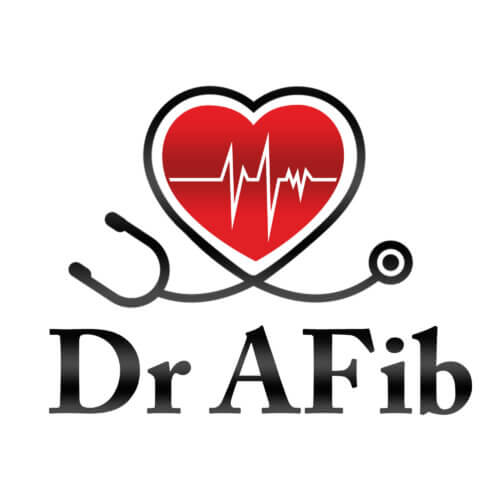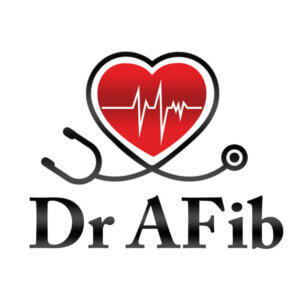Read more about blood thinners for AFib in this article. Anticoagulants or “blood thinners” are medications that help to reduce the body’s natural clotting processes. They can decrease the risk of unwanted clots caused by atrial fibrillation (AFib) that can cause strokes.
If you’ve been diagnosed with AFib, your cardiologist may want to start you on a blood thinner as part of your treatment.
There are five blood thinners currently on the market that are approved to help prevent stroke in patients with AFib. Your doctor will help you choose which medication is right for you.
In this article, we’ll compare the available blood thinners for AFib.
Why Are Patients With Atrial Fibrillation Prescribed Blood Thinners?
In atrial fibrillation, the heart’s upper chambers (called the atria) beat irregularly. This can cause sudden symptoms such as heart palpitations, feeling short of breath, or fainting.
One of the biggest risks of AFib is that the irregular rhythm of the heart can cause stagnant blood to pool in the uppers chambers of the heart long enough to start to clot.
This clot can then travel through your bloodstream and become stuck in one of the smaller blood vessels of the body. Depending on where the blood clot becomes stuck, it may cause a stroke. Unfortunately, a stroke due to AFib can be more disabling when compared to other types of strokes.
Your doctor will likely prescribe an anticoagulant to reduce your body’s ability to form blood clots. This will reduce the chance of your body making an unwanted blood clot that causes a stroke or other problems.
What Are the Approved Blood Thinners for AFib?
Warfarin
Warfarin, also known by the brand name Coumadin, is a blood thinner that was first approved for use in the US in 1954. Patients take it once-per-day.
The downside of warfarin is that it does require frequent blood testing to adjust the dosage. You also need to be careful not to make any drastic changes to the amount of Vitamin K rich foods (such as spinach, lettuce, or broccoli) that you typically consume.
Studies have varied in describing the rate of major bleeding associated with warfarin but most found between 2.4-8.1% risk per year. There was a 1.6% per year risk of a stroke.
The blood-thinning effects of warfarin can be quickly reversed with an injection of Vitamin K.
Pradaxa
Pradaxa (dabigatran) was approved by the Food and Drug Administration to prevent stroke in patients with atrial fibrillation in October 2010. It was the first medication approved in the category of the newer direct oral anticoagulants. Several additional medications were later approved over the nexxt few years.
It is a twice-daily pill. There are no required routine blood tests and no dietary restrictions for Pradaxa.
Previous studies have found that there is a 1.12% risk of stroke and a 3.47% per year risk of major bleeding with Pradaxa.
Pradaxa does have an approved reversal agent that can be used to reverse its effects in an emergency setting called Praxbind. It is given intravenously and thus is only given in a healthcare setting.
Xarelto
Xarelto (rivaroxaban) was created by Bayer and is marketed by Janssen Pharmaceuticals in the US. It was approved for stroke risk reduction in AFib in the US in November 2011.
Xarelto is taken once daily with the evening meal. There are no routine blood tests required or dietary restrictions. The once a day dosing of Xarelto is appealing for many patients.
Previous studies have found a 1.7% risk per year for stroke and a 3.6% risk per year of major bleeding with Xarelto.
Andexxa is a reversal agent approved for emergency use to counteract Xarelto.
Eliquis
Eliquis (apixaban) was developed by Bristol-Myers Squibb and Pfizer and was approved in the US for reducing stroke risk in patients with atrial fibrillation in December 2012 after completion of the ARISTOTLE clinical trial.
Eliquis is a pill that is taken twice a day, with or without food. There are no required routine blood tests and no dietary restrictions.
Previous studies have found a 1.27% risk per year of a stroke and a 2.13% risk per year of major bleeding events in patients taking Eliquis. The lower rate of major bleeding when compared to other blood thinning medications is a significant reason why Eliquis is one of the most popularly prescribed blood-thinners for AFib.
Andexxa is also FDA approved to reverse Eliquis in an emergency situation.
Read more about Eliquis side effects here.
Savaysa
Savaysa (edoxaban) is a direct factor Xa inhibitor that was developed by Japanese pharmaceutical company Daiichi Sankyo in 2011. It was approved for use in the US in January 2015.
It is a once-a-day-pill. There are no routine blood tests or food restrictions with Savaysa.
Previous studies have demonstrated is a 3.1% per year risk of major bleeding with Savasa and a 1.2% risk of stroke.
There is currently no approved reversal agent for Savaysa, although Andexxa is currently being studied.
Eliquis Vs Xarelto – What Do I Choose For My Patients?
By far, Eliquis and Xarelto are the top prescribed blood thinners for AFib in the United States. Overall they are usually well tolerated and are a preferred formulary status on many prescription drug plans.
There has overall been no direct head to head comparison of any of the newer blood thinning medications. However, the largest comparison is the 2018 ARISTOPHANES Study. This was a retrospective study of pooled data from Medicare patient data from 2013-2015. In this very large study, over 434,000 patients were included. Here is a summary of the principle findings:
| Medication | Rate of Stroke on Medication | Rate of Major Bleeding |
| Eliquis | 1.3 | 3.6 |
| Xarelto | 1.4 | 5.4 |
| Pradaxa | 1.4 | 3.6 |
| Warfarin | 2.1 | 6.3 |
In general, in almost every study, newer blood thinners have consistently performed better then warfarin when it comes to stroke risk reduction, with a lower rate of major bleeding, which includes intracranial bleeding.
Which blood thinner I pick for my patients depends on a variety of factors. For patients with a signfiicant concern for bleeding risk, I will likely choose Eliquis, as multiple studies have indicated a lower risk of major bleeding. However, there are some indications, such as patients with diabetes or severely obese patients where Xarelto has some favorable data. Also factors such as age, weight, or the presence of underlying kidney disease may also affect the medication or the doseage of a particular blood thinner I choose for my patient.
Of course, another factor to consider is cost. All of these medications make contracts with insurance companies which lead to a wide range of out of pocket costs for these medications. Whichever of these medications is a preferred status and a lower cost to the patient will also likely factor into my decision.
Read more about Eliquis savings plans here.
Read more about Xarelto savings plans here.
By far, I will prescribe Eliquis or Xarelto to my patients, as newer blood thinners have consistent data showing a favorable reduction is risk of stroke and a lower bleeding risk when compared to warfarin. In general, the only times I prescribe warfarin for nonvalvular AFib these days is for cost related reasons, there are some patients where the newer blood thinners have an out of pocket cost that is too high for them.
In the end, it is an individualized decision regarding which medication is best for you regarding your specific circumstances, so as always, discuss with your doctor which medication is the best option for you.
Can Aspirin Be Used as a Blood Thinner for AFib?
Aspirin is an anti-platelet drug. This means it prevents the platelets in the blood from clumping together to form a clot.
Aspirin monotherapy, or using aspirin by itself, was previously an option to prevent unwanted blood clots for patients with atrial fibrillation.
However, further studies have shown that aspirin alone is not effective in reducing the risk of disabling stroke and it is no longer recommended.
Previous studies comparing aspirin monotherapy to warfarin have found that aspirin is “consistently and substantially less effective” than warfarin at reducing stroked due to blood clots in patients with AFib.
Are There Any Natural Blood Thinners for AFib?
There are several herbs and other foods that naturally contain substances that thin the blood and reduce clotting. Many patients question if these can be used in place of prescription blood thinners.
Although there are several natural treatment options which can significantly improve symptoms of atrial fibrillation, and have been clinically tested to reduce symptoms of AFib, the same cannot be said when it comes to stroke risk reduction. Prescription blood thinners have been tested in hundreds of thousands of patients in clinical trials and have been found to consistently reduce risk of stroke. The same cannot be said about natural blood thinners.
While adjusting your diet to improve your health is encouraged, unfortunately, it can’t replace anticoagulants for reducing risk of stroke from AFib for a couple of reasons:
● Natural blood thinners have never been tested against prescription blood thinners in patients with atrial fibrillation so we don’t know how well they would work.
● There are no standardized doses for herb/food blood thinners so we wouldn’t know how much you should take.
● Supplements can vary in the amount of active ingredient they contain between brands so one brand might we stronger or weaker than another even if they are the same herb or supplement.
● In very limited data on nattokinase, a popular natural blood thinner, animal models performed on rabbits showed that nattokinase is significantly weaker then aspirin in terms of its blood thinning affects. As I discussed above, aspirin is no longer recommended for stroke risk reduction due to its relatively weak blood thinning effects.
So for preventing blood clots due to atrial fibrillation, you’re going to want to stick to prescription medications. These stronger blood thinners have been studied in hundreds of thousands of patients and have consistently shown to reduce risk of stroke in patients with atrial fibrillation.
In Review
There are a number of blood thinners for AFib available. All of the medications have the same goal of reducing your risk of developing unwanted blood clots due to atrial fibrillation.
While being the oldest and longest-studied, warfarin requires routine blood work and dose adjustments. There are also several dietary restrictions.
Newer medications such as Eliquis, Xarelto, Pradaxa, and Savaysa don’t require routine blood testing or any dietary restrictions and have become the class of medication most commonly prescribed for AFib.
Warfarin, Eliquis, Xarelto, and Pradaxa all have approved reversal agents. Savaysa does not yet, but one is being studied.
Your doctor will discuss your lifestyle and the pros and cons of each of these medicines with you and help you choose which blood thinner is right for you.
The Best Atrial Fibrillation Book
Your Complete Guide To AFib: The Essential Manual For Every Patient With Atrial Fibrillation

Shop AFib Products on Amazon
KardiaMobile 6-Lead Personal EKG Monitor – Six Views of The Heart – Detects AFib and Irregular Arrhythmias – Instant Results in 30 Seconds – Works with Most Smartphones - FSA/HSA Eligible
13% Off
KardiaMobile 1-Lead Personal EKG Monitor – Record EKGs at Home – Detects AFib and Irregular Arrhythmias – Instant Results in 30 Seconds – Easy to Use – Works with Most Smartphones - FSA/HSA Eligible
$79.00 (as of June 16, 2025 15:14 GMT -06:00 - More infoProduct prices and availability are accurate as of the date/time indicated and are subject to change. Any price and availability information displayed on [relevant Amazon Site(s), as applicable] at the time of purchase will apply to the purchase of this product.)
Apple Watch Series 9 [GPS 41mm] Smartwatch with Storm Blue Aluminum Case with Silver Sport Band M/L. Fitness Tracker, Blood Oxygen & ECG Apps, Always-On Retina Display
(as of June 16, 2025 08:46 GMT -06:00 - More infoProduct prices and availability are accurate as of the date/time indicated and are subject to change. Any price and availability information displayed on [relevant Amazon Site(s), as applicable] at the time of purchase will apply to the purchase of this product.)
Fitbit Sense 2 Advanced Health and Fitness Smartwatch with Tools to Manage Stress and Sleep, ECG App, SpO2, 24/7 Heart Rate and GPS, Shadow Grey/Graphite, One Size (S & L Bands Included)
10% Off
OMRON 2-in-1 Upper Arm Blood Pressure Monitor & 1-Lead EKG Monitor - Clinically Validated Blood Pressure Arm Cuff & Machine - Use OMRON Connect App
24% Off
Samsung Galaxy Watch 6 44mm Bluetooth Smartwatch, Fitness Tracker, Personalized HR Zones, Advanced Sleep Coaching, Heart Monitor, BIA Sensor, Health Wellness Insights, Big Screen, US Version, Graphite
$353.21 (as of June 16, 2025 07:34 GMT -06:00 - More infoProduct prices and availability are accurate as of the date/time indicated and are subject to change. Any price and availability information displayed on [relevant Amazon Site(s), as applicable] at the time of purchase will apply to the purchase of this product.)
Natural Rhythm Triple Calm Magnesium 150 mg - 120 Capsules – Magnesium Complex Compound Supplement with Magnesium Glycinate, Malate, and Taurate. Calming Blend for Promoting Rest and Relaxation.
$20.77 ($0.17 / Count) (as of June 16, 2025 07:34 GMT -06:00 - More infoProduct prices and availability are accurate as of the date/time indicated and are subject to change. Any price and availability information displayed on [relevant Amazon Site(s), as applicable] at the time of purchase will apply to the purchase of this product.)
Pure Encapsulations Magnesium (Glycinate) - Supplement to Support Stress Relief, Sleep, Heart Health, Nerves, Muscles, and Metabolism* - with Magnesium Glycinate - 180 Capsules
$44.60 ($0.25 / Count) (as of June 16, 2025 08:46 GMT -06:00 - More infoProduct prices and availability are accurate as of the date/time indicated and are subject to change. Any price and availability information displayed on [relevant Amazon Site(s), as applicable] at the time of purchase will apply to the purchase of this product.)















![Apple Watch Series 9 [GPS 41mm] Smartwatch with Storm Blue Aluminum Case with Silver Sport Band M/L. Fitness Tracker, Blood Oxygen & ECG Apps, Always-On Retina Display #1](https://m.media-amazon.com/images/I/311xwtp4mFL._SL100_.jpg)
![Apple Watch Series 9 [GPS 41mm] Smartwatch with Storm Blue Aluminum Case with Silver Sport Band M/L. Fitness Tracker, Blood Oxygen & ECG Apps, Always-On Retina Display #2](https://m.media-amazon.com/images/I/41j+8AaUGsL._SL100_.jpg)
![Apple Watch Series 9 [GPS 41mm] Smartwatch with Storm Blue Aluminum Case with Silver Sport Band M/L. Fitness Tracker, Blood Oxygen & ECG Apps, Always-On Retina Display #3](https://m.media-amazon.com/images/I/41jIyxZitnL._SL100_.jpg)
![Apple Watch Series 9 [GPS 41mm] Smartwatch with Storm Blue Aluminum Case with Silver Sport Band M/L. Fitness Tracker, Blood Oxygen & ECG Apps, Always-On Retina Display #4](https://m.media-amazon.com/images/I/41IpNJERjCL._SL100_.jpg)
![Apple Watch Series 9 [GPS 41mm] Smartwatch with Storm Blue Aluminum Case with Silver Sport Band M/L. Fitness Tracker, Blood Oxygen & ECG Apps, Always-On Retina Display #5](https://m.media-amazon.com/images/I/31o17yhfYpL._SL100_.jpg)





































